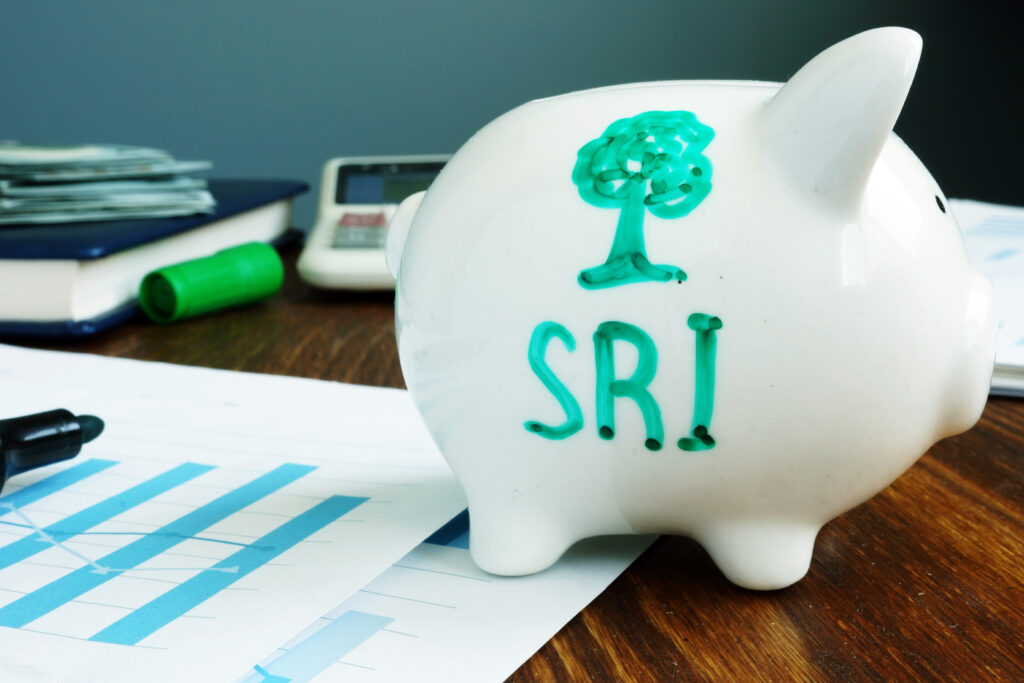
This post started as an encouragement based on my own experience, not one related to controversy with ESG. (Hence the picture with different letters). Now that the concept has become so controversial in some circles, though, it feels a little ostrich-like to write as if none of that had happened. So, instead this may become more of a series.
Here, I’ll talk about: (1) what are these acronyms anyway? (2) why all the controversy? and (3) is this at all Biblical (in the sense of consistent with Biblical values, not actually in the Bible)?
What is “ESG” or “SRI”?
ESG stands for “environmental and social governance.” It seems to be still evolving somewhat as a concept. As a result, we may be short of a standard definition. I’ve seen “ESG” framed as being the same, or at least essentially the same, as “socially responsible investing” or “SRI” (last acronym for a while) – which was what I’d intended to write about and worth reading the post for, even if you are not into or don’t agree on ESG. An introductory article in one financial magazine speaks in terms of “investing in companies that are compatible with your values;” the author also describes “struggles to invest with a value screen” in the lead-up to an issue with ESG on the cover[1] A different commentary advises: “A good investment is one that integrates your value system with the investments that you make and offers a risk level and return that meets your needs.” [2]
How can that be controversial? The ESG label also seems to get more specific. Efforts have been underway to develop a set of standards aiding in evaluating corporate responsibility, as well as to call for disclosures enabling investors to make more informed decisions in this area. To that end, you can find online various criteria concerning how a company impacts places, treats people, and governs itself; these are grouped into buckets under the applicable “E,” “S,” “G,” letters. [3]
Why the controversy?
As best I can tell, it boils down to two main issues: (1) what if my values aren’t the same as someone else’s?; and (2) what will this mean for my returns? / Can I make enough?
From a personal investing standpoint (the limits of this post), the first has a straightforward answer: that’s ok. The point consistency with your values, not someone else’s. You may disagree about particular criteria and be bothered by some part of the current ESG framing a result. Whatever debate may ensure over standards development, though, will we really argue with responsibility as a concept? And if you do dismiss the entire concept, have you also counted yourself out as a voice or an example of how it should look?
To be sure, lack of uniformity does make it more difficult. When I first started, it seemed like “SRI” plans essentially screened out alcohol and tobacco and called the rest good. For reasons outside the scope of this post, I find that both over and underinclusive. Eventually, I found a professional who could help me build an individualized plan. It may take effort (and please do screen and find the right person if you look to someone to design). But I don’t think anyone opposes effort as part of a moral value.
The second question is one to which I want to be sensitive. The fear and hardship people are experiencing during the shaking happening in the world is real. I want to approach anything financial with care. Going down this path scared me even in a different season, and even though I’d, thankfully, been taught the importance of saving and investing from a young age. Even with that benefit, what would it really mean to do something so different, and for so long?
Still, this is another critique that, while we can talk about whether or not it misses the mark, is ultimately aimed at a different target altogether. I don’t, to my knowledge, know anyone who interprets Biblical values to mean you throw whatever values you have out the window if it means, at least according to conventional wisdom, that you’ll make more money. Instead, Christians tend to praise, for example, Chick-fil-A because it adheres to its owners’ values in closing its doors on Sundays, even after receiving dire warnings about the amount of money that type of restaurant stands to lose by doing so. Despite the projections, the chain has succeeded.
Can we get to the part with the Bible verses now?
Yes. Much of this came to a head for me when I took a well-known financial class at the church I used to attend. It’s one that has helped untold numbers of people get out of debt, understand insurance, and generally get ahead in their finances in various ways. So, I was hesitant to disagree with the experts and don’t want to come across here as knocking the class as a whole. Still, I found myself able to accept every step of their process except for one: investing. The course, as I recall it, advocates investment looking purely at percentage return, omitting any consideration of impacts of the companies on people or places, or the long-term sustainability of the practices involved.
A part of me very much wanted to get on board with that process – especially since you can link to things like a calculator that shows you just how much difference a higher or lower return rate makes. At the same time, I just kept thinking, what about those verses that say “woe to you …” who do wrongful things in your business. Are passive shareholders exempt?
I don’t have an exact quote for this situation, but the general impression I received in reading is that God cares about integrity in our business dealings.
Looking for purposes of this post, you might consider:
“Woe to him who builds his house without righteousness
And his upper rooms without justice, . . .”
Jeremiah 22:13-19
“Behold, the wages of the laborers who mowed your fields, which you kept back by fraud, are crying out against you, and the cries of the harvesters have reached the ears of the Lord of hosts.”
James 5:4
“You shall not oppress or exploit your neighbor, . . .”
Leviticus 19:13
Ultimately, I just couldn’t square dropping value-based criteria with everything else I say I believe. At the end of the day, either I: (1) believe necessity requires supporting something I consider problematic so that I’ll have enough to retire or be ready for old age, or (2) believe that God is my source and will honor an effort to align investing in my financial future with whatever vision and values I have for the future more broadly. I’m not perfect at it, but it is dramatically different than not choosing that path.
[1] Molk Solheim, ESG investing Takes Off, Kiplinger’s Personal Finance, How to Profit from ESG Investing, p. 4 (Nov. 2021)
[2] The New York Times Magazine, Self-Care: Follow Your Passions, Build Healthy Habits and Embrace Optimism, p.63 (Nov. 2020) (quote from Ron Freund, Vice President, Social Equity Group)
[3] See, e.g., Environmental, Social, and Governance (ESG) Principles and Criteria (investopedia.com)
